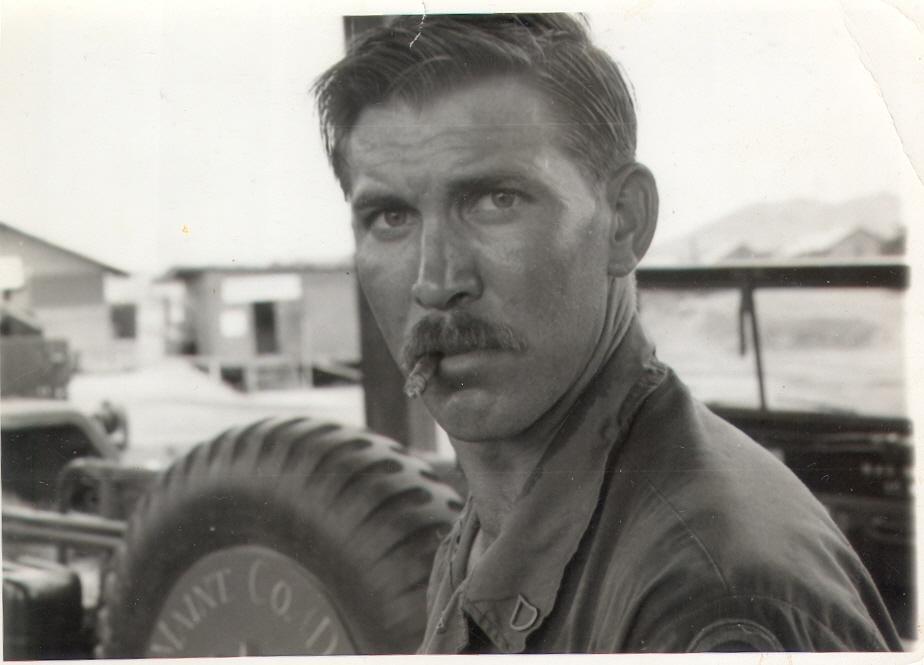INTRODUCTION
Frankie Joe Hodge was born in April 09, 1944,in San Antonio Texas; he is a son to Willie Arthur Hodge, his father who was born in Wimberley, Texas and Nadine Hodge, his mother, born in Brackettville, Texas, and was raised in San Antonio, Texas.
He has three brothers and three sisters. Mr. Hodge was a mechanic in Vietnam during the war; he was in charge of keep vehicles, trucks and equipment in good shape. He lived in Tacoma, Washington for six months when he served in the army, but the rest of his life he has lived in San Antonio. When he was a child and a teenager he finished the ninth grade, but in the army he finished his GED. He has been a heavy equipment manager, a shop manager and an equipment salesperson for a living most of his life. Mr. Hodge met his wife, Linda Hodge in 1960 at a "Tupperware party", it was love at first sight for him, but not for her. He was baptized at a Baptist church at the age of sixteen, but is not a faithful church attendant. He doesn't have a political inclination, but always votes for the candidate he believes is going to do the right job. He and his wife never had children and actually live a pretty fair financial situation. He loves hunting, loading riffles; gives maintenance to his guns and enjoys anything related with arms.
He has now some health problems, but is been treated "when you get old, you get sick, don't get old Alfredo" He says!
He has diabetes problems, hearth, blood pressure, he doesn't hear and see very well as he used too and has aches and pains all over his body, but enjoys life and the fact of being still alive means a lot to him. He is a strong kind man who likes to help people. The first time we met, I was in the parking lot of a lumber store waiting for a friend, but also looking for a job because I was unemployed. He was ready to go; I realized he forgot to tie all the construction material he had in his trailer, so it all fell down and I helped him to put everything back in the trailer, he offered some money, but I did not accept; instead, I asked for a job and he gave me the opportunity to go and give him an estimate and after we saw the costs, he agreed on my estimate and gave me the job. Since then, we have been good friends and of course Mrs. Hodge is a great person also. Mr. Hodge could be a role-model for many young men, because he never gives up and is always positive in what he does.
TRANSCRIPTION
How is a normal day in your life?
Busy, I do yard work around the house now that I'm retired, work out of the rifle range and um… just do general repairs and you know things you need to do to get it up with the house.
Do you remember your grandparents?
On one side of the family yes.
What are the most vivid memories you have about them?
About the farm where I used to live, the activities we did, we spent the summer with them and do a lot of the farm work and things like that, and those are the most vivid memories that I have.

What are the most vivid memories you have about them?
About the farm where I used to live, the activities we did, we spent the summer with them and do a lot of the farm work and things like that, and those are the most vivid memories that I have.
Did you have a happy childhood?
Yeah, I think so.
Why?
Well I had a good childhood, we weren't abused or things like that. My mom and Dad raised seven kids and ah, we were always had chores to do and they were very strict to us, we had a… really a good childhood though.
Do you remember your childhood friends?
Sure, oh yes! Yeah I remember this kid I went to school with and uh, one good friend I had it was Mario Martinez and he was a stable's owner's son they had their stable down Fort Sam Houston and he and I was really good friends, we spent time together and had really good times.
Is he still alive?
I don't know I haven't seen him in many, many years I don't know if he still alive or not.
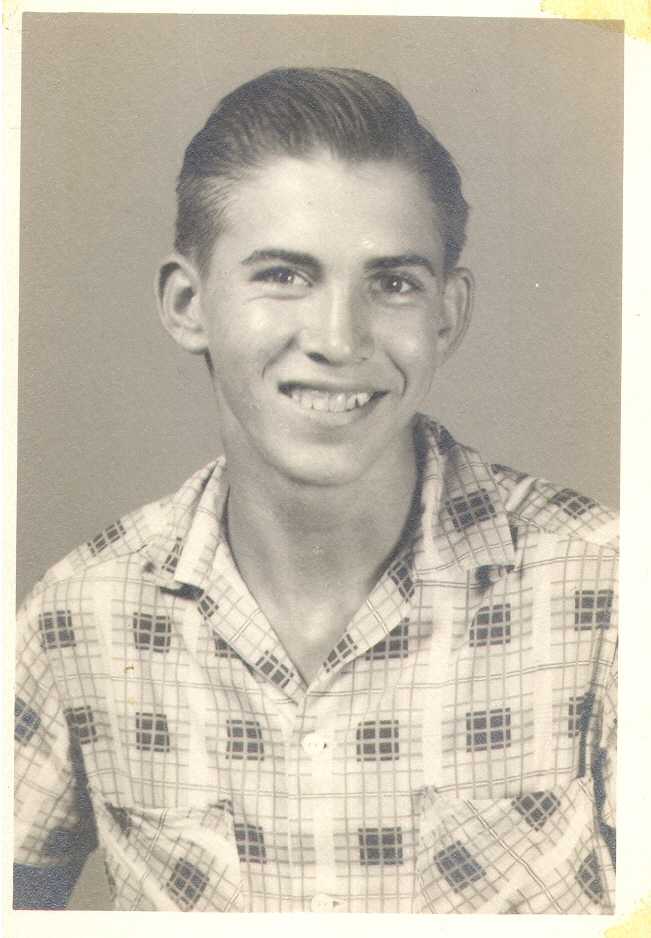
Do you remember any other war happening during your childhood?
Not outstanding, no, I think we had pretty good childhood raising events and things like that, again ugh, even then we had a lot of chores to do we weren't at all from a pretty well family and we had to get out of the hustle a little bit and probably make a little money so we could have some money to spend that way we could buy a little soda, a little candy and uh be able to do what we wanted to do something like that so yeah, it was ugh, pretty normal.
Describe how a typical day was at school (elementary), at work etc.
Yes I do remember going to school and like I said as soon as we got home we got some chores to do and ah, we had to do all these things and then we had to do our entire book work and ah, that's really about it.
What did your parents do for a living?
My mom was a housewife she didn't work, at that time moms didn't do much work outside of the house, but dad was a truck driver most of his life that's what he did, and ugh we would have to do chores and things like it because he was gone most of the time.
And did you go with him in any traveling?
Yes I did, that was really exiting to do the driving on the free way.
And did you learn how to do it?
Yeah, yeah, as a matter of fact I even drove some a little bit myself in my younger years but very little but after my dad did it for years and years I just didn't really think that was something I wanted to do for a living.
What things do you think have changed along your life?
Well actually I have learned a lot and earned a lot of experiences since I was a young man you may say and um, now that I'm retired and really don't have to work too much about anymore, just a big memory of things that I had to do and things that I didn't do, things that I didn't learn so, and now I can think I better fit 'cause I do know how to do a lot of things I need to do, and I stay pretty busy doing it.

And about society and government…
Well actually yeah, the government has changed a lot and society has changed in all kinds of ways as far as laws, ugh, the way they raise children today, the way children act toward parents today, the way children act… period!! Today um, it's just a big difference from what it used to be when we was a child.
How did the G.I. bill affect you?
It did allowed us to buy a new home by using the G.I. Bill because they had a much lower interest rate, so that allowed us to be able to do that because otherwise we didn't have the income to what we can afford to buy, a normal ugh, nice house at that time, ehh, but that did allowed us to be able to do that so we did take advantage of that.
So it was right after the war?
Well actually the G.I. bill came in before that but ah, naturally after I got out of the service then I did use it yeah.
What did the family members do to help mom and dad?
We did ah, all kinds of chores many of the guys did outside chores like cutting the grass, clean up around the house, garden work, ah, fence work, whatever needed to be done in the outside, because like I said my dad was gone most of the time and my sisters primarily did the inside work just like women did so that they learned how to do things like you know housekeeping, and ah, things that women normally did back then, it was not like it is today where they go out and play all time, we didn't have T.V. we did not have internet and radio.
Do you remember your first date?
No I really don't. he he…
O'kay with your wife…
Not real strong, but I do remember, yeah I'm sure we went to a drive in theatre, back then we used to have a what you call a drive in movies and that's where we went most of the time when we was on a date. There used to be eight or some of it around here of San Antonio back then yeah, maybe even ten I can't remember, there used to be a bunch o them around down town, but there was a few movies on downtown that you could go to like the Alameda and The Texas and things like these that was downtown, but those was always pretty fancy and more expensive than going to the drive in theatres, we went on a date every once a week, and maybe some other time go to the park and then go swimming or something like that but ah, most of the time it was entertainment like go to the movies and ah, Dollar Carlo, you could go in the and just pay a dollar and you could have a couple of friends plus your date and you could watch like two or three movies for a dollar!

How much was a hamburger combo?
Well back then they didn't have hamburger combos
you could buy a burger and fries separately, for a hamburger you would pay 35 cents and for the fries around 15 cents, so you would get a hamburger and the fries and a drink for probably a dollar or something like that, and ah, that was back in 1960, 61, and gas was like a, it was pretty stagy back then, it was probably like 27 cents a gallon and you go to the movie and you leave home with five dollars out of your pocket and you could go by a couple of dollars with the gas and go by the movie and then go buy something to eat and still maybe have some money left over after by the time you got home, so back then they had what they called gas wars and the gas stations was competing one another and actually one would lower the price on their gas and the one next door or across the street would go down a penny or two, so sometimes it would go down to 19 or 18 and even 17 cents a gallon, back then that was a lot of money but when you don't have the five dollar or something like that, 17 cents, that was still quite a bit and today, today you go and look for a dollar of gas and you don't even get a gallon, you know and ah, like I see some of these panhandlers that walk up toward you at the gas station and they say: "Do you have a dollar so I can get some gas?"- I mean how far can you go to with a dollar? Then I used to work in one of those places, I would pump gas and ah change the oil, clean the wind shield and so, you know the man I worked for told me -"if I ever catch you asking somebody if.. Do you want your windshield washed or wiped? you are fired!!!
You just wipe that windshield and if they tell you don't wipe it that's fine, but you don't ask them if they want it or not, you just do it, if you don't do it you are fired!"-
So back then you just would do whatever the situation was and the attendant, by that time that's what they were called, attendants, would take care of the situation, raise the hood on your car and check the water, the oil and then gas and wipe the windshield, ask him if he had enough air in the tires and things like that, but when I worked at that gas station I worked there for like 50 hours a week and it was like for $50 dollars a week and it was pretty fair pay back then for doing something like that.
Was your father very severe?
He was pretty strict, yeah, normally if they told us you to do something, mom or dad either one, we better do it and we didn't have any excuses of why we didn't do it, so they meant what they said, but it was a lot of fun and we had a lot of good times together, we would go fishing and swimming and things like that.
Was there a time in your life when you fell lost?
No, I can't even say there's has been a situation like that, not that I can think of.
For you what were the main reasons for Vietnam War?
For me? I got drafted I didn't have a choice, ha ha! But the main purpose of it was ah, was the communist situation in South Vietnam and that's what the united states society keep them out; my main reason was to survive, but actually I didn't have a whole lot of folks on that other than just did what I needed to do, and that's what I did, I just went over and did what I needed to do and came back home.
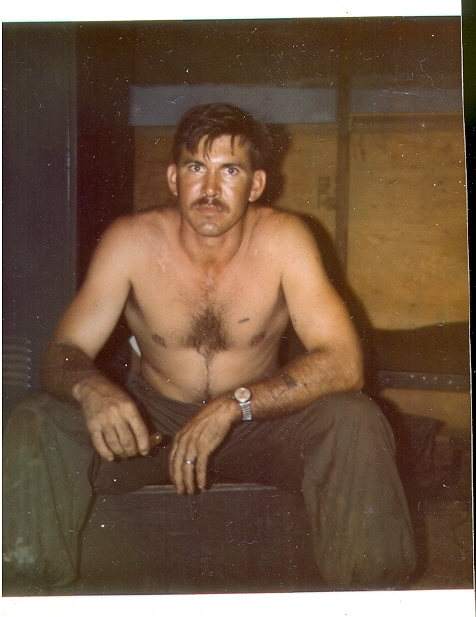
Do you remember the training days?
Yes I do, they were hot; I spent 10 hours a day training in El Paso, Texas and the weather out there is really, really, really hot and dry and it was a really big change from going to Vietnam 'cause it was really, really hot and really, really wet so it was a big difference in the climates.
When did you live to Vietnam? When did you arrive?
I don't remember exactly the date, but the year was 1969 and I stayed there one year.
What was your job in Vietnam?
I was ah, what they called vehicle mechanic and ah, after I was there for a few months I changed occupations until I got to be an engineer equipment mechanic, so I worked primarily on construction equipment like bulldozers, loaders and things like these.

Did you write to anybody during the war?
Oh, yes, yes; I wrote to my wife, and very frequently I wrote my mom and dad.
Was there a time when you thought you were going to die?
There were several times that I thought that I may die, you know get shot or whatever, yes there were several times, that situation did come up, thankfully it didn't happen.
Do you consider yourself lucky about surviving?
Yes I do.
Did you have a nickname?
Yeah, my nickname was the old man, because I was older than anybody else over there, even my captain, my commander was younger than I was, 'cause when I was drafted I was 25 years old, most of the guys that was over there was 18, 19, 20, 21 something like that and here I was 26 when I went over there, so here it is why I got that nickname and that was in the radio and… but anyway that was my nickname.
Where you ever wounded?
No, thankfully I was not wounded but actually I got injured numerous times in the mechanical line, but that's pretty normal for the mechanics to get, you know.
Did you make any friends?
Yes I did, yeah; there was 3 0r 4 guys that was really very good friends that I had when I was over there, because you need some friends when you was over there, sometimes you needed some confident when you was over there, you know like when you think you may gonna die, you need to share the load.

Did you lose any friends?
No while I was there, I understand that some of them lost their life the day after I left, but ah, I'm not very sure of that, I don't know that for a fact but I heard that.
Where there many Hispanics in the war?
There was not lot of them, there were some, but most of them was white guys and there was a few black men, there was a lot of Cubans and a lot of Puerto Ricans while I was there.
Describe the paratroopers:
I know what they are but not who they are, in Vietnam they didn't even use paratroopers, over there they jumped tem out of helicopters and that's what they used what they called the airborne, but in Vietnam they wouldn't use the paratroopers because of the trees and things like that.
Why do you think there are many veterans without a fair living?
I think that is the aftermath of the drug abuse from Vietnam and there was a lot of drugs over there really available, you could buy, you could trade for ah, really, really easy and I think a lot of people got hooked on it and probably messed up their minds and they are still messed up, and when I see people out on the streets that say they are Vietnam veterans and they look like a bomb, then I really don't feel sorry for 'em because that was just an easy way for them out, but it has changed, back then people had bad attitude about the war because you know a lot of people didn't think we had to be over there, they had a different attitude toward the military people, than what they have now, which is good, because now you know they call all of them heroes, which I don't think is right either; I don't think a person is a hero only because they do what they are supposed to do, that's what they sign up to do, they agree to do, now if they go out and do something heroic, like save someone's life or do something that's outstanding or something like that, to me that's a hero, but just because they went over there and maybe they got killed, you actions happen and just like myself, I went over there, I didn't get shot, I didn't get injured or anything like that and I don't consider myself being a hero; I just did what I was supposed to do and I think that I did what I needed to do, but I don't think I am a hero or anything even close to a hero.

Did you feel you were fighting for your country?
Oh yes! I still do, I think I did what I had to do, so I feel god about it.
Did you learn how to cook?
No! I never learned how to cook when I was over there.
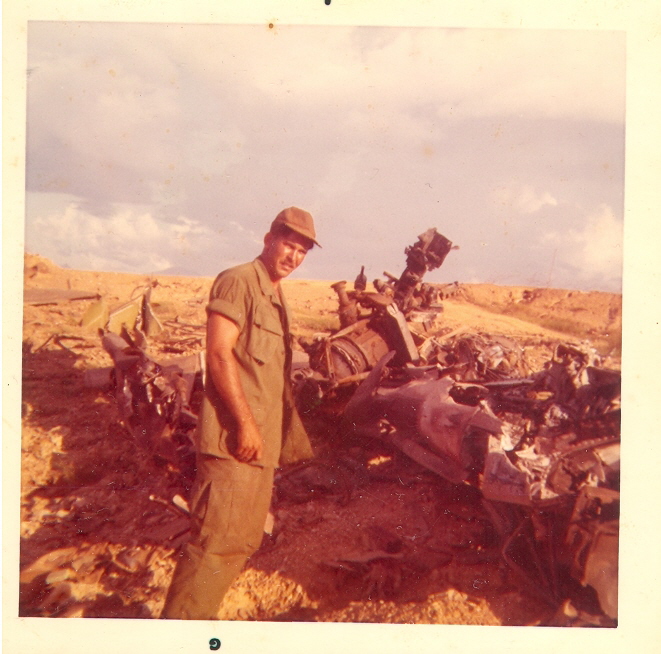
How often did you take a shower?
It just depended on where you was at, what you were doing at that time, but most of the time it was every day or so, you could take a shower pretty quick, but there was times when you wouldn't for maybe a couple of weeks and you could smell pretty strong about that, ha, ha!
Tell me about P.OW. -M.I.A.
Article, article 15; and it still current today and it's been current for years and years, 'cause is an old, old, 'cause it is a legal thing; it's kind of like ah, a misdemeanor or a major crime or something like that, and what it is that when they charge you for doing something that is wrong, it's like a law, and it really is a minor law, that's what it is, but in terms of military, they would take some of your stripes away or they would take one of your salaries away for a certain period of time and thankfully I didn't get that in the military when I was either.
How did America receive the soldiers?
Very poorly; the attitude of the American citizens back then in the Vietnam era was really, really poor and they had bad thoughts about them, and when they came back home from over there, they was received in a real rude manner, a lot of them was spit on, kicked at, cussed, had ah, bad words on them, so it was really bad, and that didn't make a lot of them feel real good about that happened when come back home, so it was really a bad situation back then.
When you came back, was it hard to adapt from the war to a more civilized life?
It wasn't hard, but it did ah, there was a time period where I did had to do a lot of adapting and re-adjust in my life style and my reflexes and my vocabulary; it needed to be changed considerably because it was really, really bad and then like suddenly noises or movements or things like that, and would really get upset real quick, but thankfully I got emotionally rid of that.
Did you get any medical conditions from Vietnam?
Yes, I got ah, what they call agent orange, and it's a spray that they used over there to kill foliage and it also presented medical problems for people that was involved in or around it, so even today I still have that medical problem.
What would you do for your country in the actual time?
Well, now I think there's a lot whole of things that I can do, but maybe be a political active or something like that but that is about it.
Are you happy with your actual life?
Yes, I really am.
Is there any other thing you would like to add, how did you feel about being interviewed?
No, I think that it was fine, something different; it brought back a few memories.
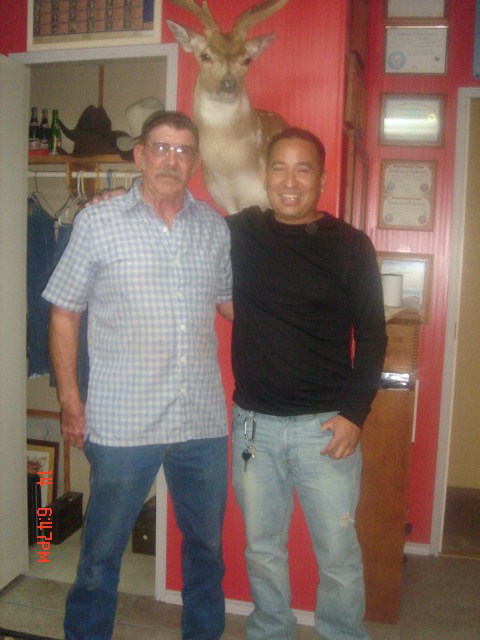
ANALYSIS
By doing this oral history project, I learned how Vietnam Veterans can handle the aftermath (postwar traumas) in a different way, according to their perception of what is right and what is wrong; courage, determination, love for the others and respect are just some of the qualities I found in Mr. Hodge (the interviewee) and that is something I already knew about life, but he is a clear example of how you can apply that knowledge in this life. Along the interview, we talked about many things, for instance, how things were back in 1960, and the cost of life and fun, if you want to see it that way; we talked about Vietnam, family, health and progress, but one of the things that mostly impressed me during this interview was when I came up with the question about Veterans, and the answer he expressed is totally right for me; maybe the fact of seeing a panhandler in the crossroads around the city, makes you feel sorry about them and then the next thing to do is put your hand in your pocket and share some change, but maybe you have to think it twice, there is always an easy way to get out of problems, but real men always choose the hardest one.
In Monclova, Coahuila, Mexico, the town I was born in, you can see typical south Mexican tribes women standing in some traffic lights with a bunch of kids holding the baby one with a long blanket (reboso) tied around her body asking for money, and then you wonder … "Where the father of these children can be?"
As I mentioned before in his biography, Mr. Hodge and I met in a lumber store, when I was looking for a job and he gave me the opportunity I was looking for, but I didn't know he was a veteran until we went to buy all the supplies we needed for the project; I didn't know about agent orange and San Antonio History and this is knowledge I learned from him also. I was to resume this experience in six words, those would be learning through cultural exchange and friendship. After this interview, Mr. Hodge was exactly the same person I first met; didn't affect at all the fact of him being interviewed by me, nevertheless, it made our friendship stronger. During the interview, he was calmed, fluent and always aware of the situation, never cried or felt sad about memories, in fact, we there were several times when we were laughing about it, so it was a wonderful experience for both of us. Sometimes I didn't know what he was talking about, so after the interview, I had to go to a variety of web pages to keep myself informed about the topics, for instance, when he told me about his medical condition (Agent Orange) or about the places they used to go for fun.
For me, it was a wonderful experience I had never had, but somehow I really wanted to do, and later I want to do the same project with my father, because for me he has a lot of things to share with us. I learned a lot form this project, Mr. Hodge is a role-model for me and I am still learning from him, there are no drawbacks in this experience, only a good taste of knowledge. This is an excellent source to learn about the past, about culture and life itself, there is always something new to learn from everybody, you just have to make a stop and ask, and then share what you learned. Thank you for reading this oral history project .
TIMELINE
- was born in April 09, 1944.
- His older brother was born in 1941.
- His second brother was born in 1946.
- His first sister was born in 1950.
- His third brother was born in 1958.
- Attended MacArthur High School in San Antonio, Texas
- Met his wife, Linda Hodge at a "Tupperware Party" in 1960.
- Mr. Hodge finished his last year at MacArthur High School in 1961, but did not finish it.
- Got married to Mrs. Linda Hodge in June the second of 1962.
- Second sister was born in 1961, in the back seat of his car.
- Third sister was born in 1964.
- Was drafted in the military in April 10, 1969.
- Finished his G.E.D. (General Education Degree) in the military in 1970.
- came back from Vietnam in March, 1971.
- worked as a lead mechanic for Ingram Equipment Company
ANNOTATED BIBLIOGRAPHY
List a minimum of FIVE sources. There must be links to each of the sources within the transcription. Consult Citing Web Sources MLA Style for further help.
Here are five examples of annotated sources plus a source for photos/documents.
G.I. bill
- The Handbook of Texas Online
is a multidisciplinary encyclopedia of Texas history, geography, and culture sponsored by the
Texas State Historical Association and the General Libraries at UT-Austin. It was produced
in partnership with the College of Liberal Arts and the General Libraries at the University of
Texas at Austin. Copyright © The Texas State Historical Association.
- Texas Escapes Online Magazine: Travel and History has an extensive collection of annotated photographs of twentieth century Texas. Included in the collection are historical images of courthouses, churches, schoolhouses, banks, jails, cemeteries, gas stations, and water towers. Website Content Copyright ©1998-2008. Texas Escapes - Blueprints For Travel, LLC. All Rights Reserved.
- Small Town Texas Projects. Palo Alto College student/s ___________________ project on the town of ____________________________, Texas. This Small Town Project was completed in the _____________ semester of 200_ as a requirement for Assistant Professor of Robert Hines's History 1302 class.
- Cost-of-Living Calculator. The calculator uses the Consumer Price Index to do the conversions between 1913 and the present. The source for the data is the Bureau of Labor Statistics. The Consumer Price Index reflects the cost of items relative to a specific year. The American Institute for Economic Research. P.O. Box 1000. Great Barrington, Massachusetts. 01230.
- Photographs and/or documents on this website were provided by name of interviewee and ____________________. Provide some historical background on the photos/documents. e.g. Who is in the photo/s? Who took the photo/s? Where was the photo/s taken? When were the photo/s taken? Special occassions? Everyday life? They were from her/his photo album... Located in the kitchen drawer...
Return to Oral History Projects
